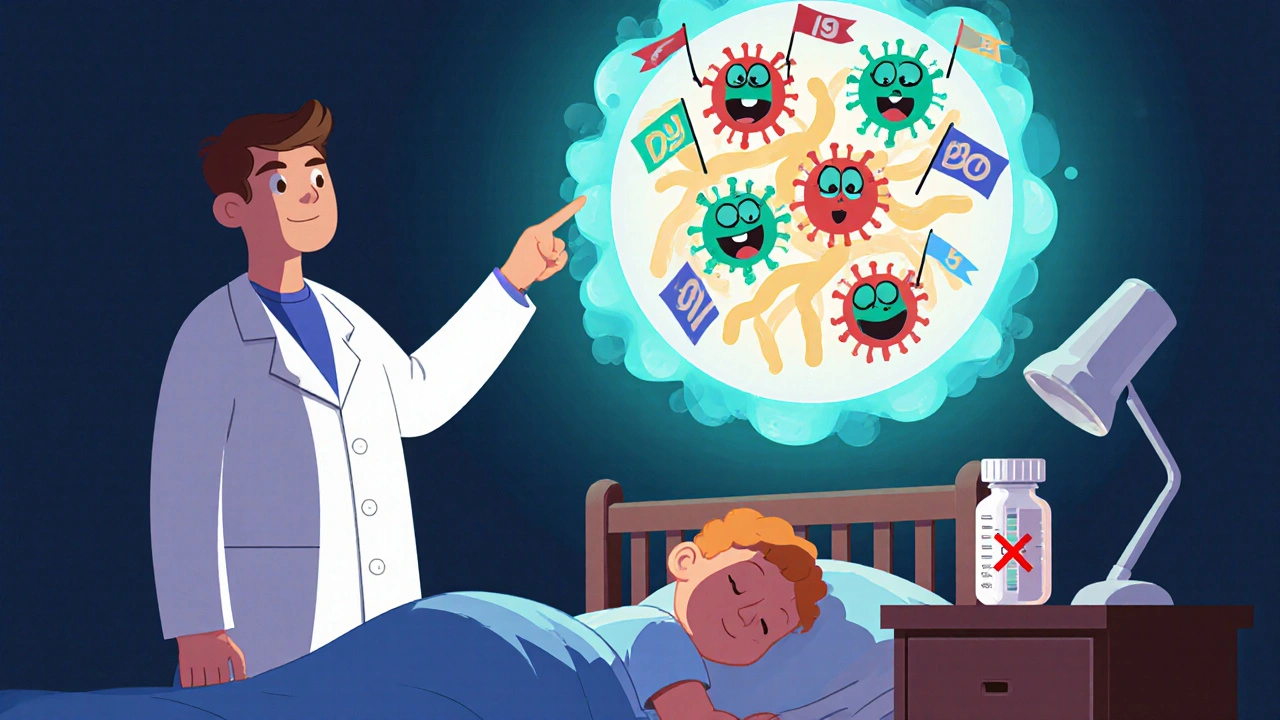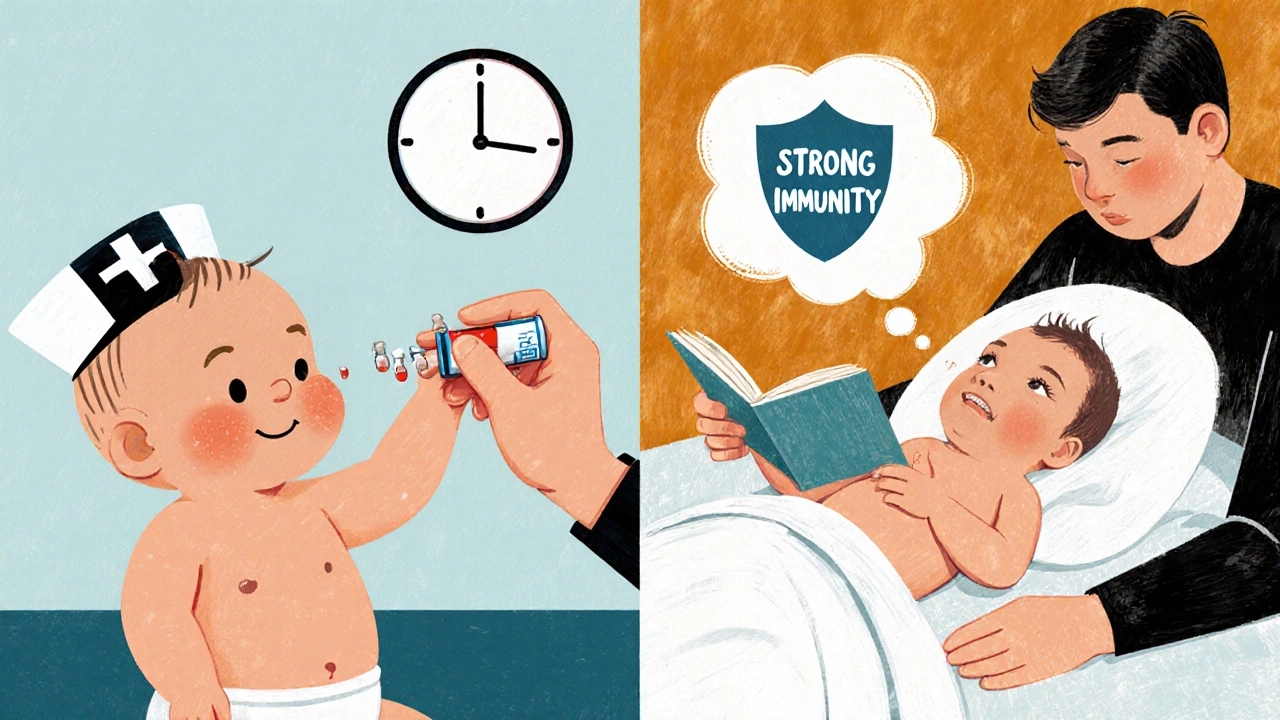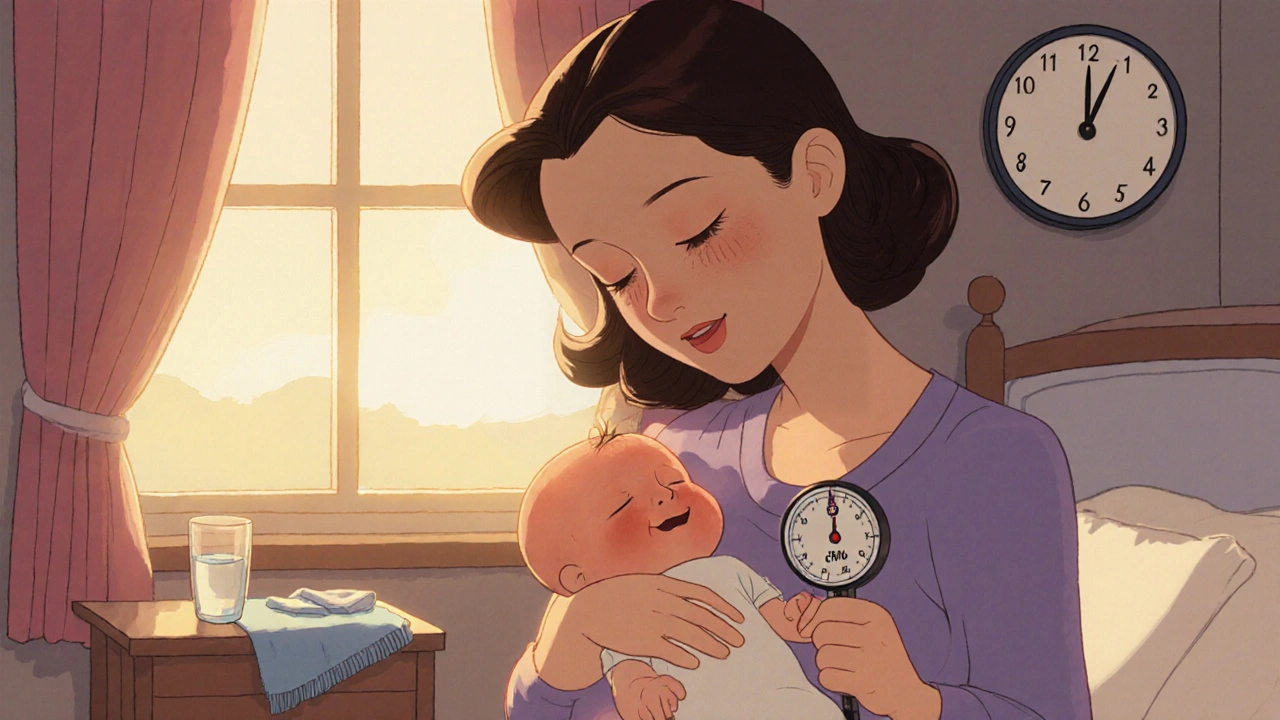When your baby gets their shots, it’s normal to see a fever pop up a few hours later. It’s scary. Your little one is hot, fussy, and you want to make them feel better-fast. But giving fever medicine right away might actually be doing more harm than good. The truth? vaccination fever reducers need careful timing to protect your child’s immune response while still keeping them comfortable.
Why Fever After Vaccines Isn’t Always Bad
Fever isn’t a sign that something went wrong. It’s proof your child’s body is doing exactly what it’s supposed to. Vaccines work by gently training the immune system. A little fever means their immune cells are waking up, making antibodies, and getting ready to fight off real infections later. That’s a good thing.Most fevers after vaccines are mild and short-lived. According to Seattle Children’s Hospital, temperatures usually rise within 12 hours and drop on their own within 1 to 2 days. For vaccines like Prevnar 13 or Pediarix, about 1 in 3 babies will get a fever. With the MenB vaccine, that number jumps to nearly 1 in 2. But even with higher rates, most kids don’t need medicine.
The Big Mistake: Giving Medicine Too Early
In the early 2000s, many parents were told to give acetaminophen (Tylenol) or ibuprofen (Advil) right after the shots-just to be safe. That changed after a landmark 2009 study in The Lancet showed something surprising: kids who got fever reducers before or right after vaccination made fewer antibodies.Follow-up studies confirmed it. When children received acetaminophen at the time of vaccination and then again at 6 and 12 hours, their immune response to key vaccine components dropped by up to 40%. That doesn’t mean the vaccine failed. It just means the body didn’t respond as strongly as it could have. And while antibody levels still stayed above protective thresholds, experts agree: why risk it?
The American Academy of Pediatrics, CDC, and Children’s Hospital of Philadelphia all now agree: don’t give fever reducers before or immediately after vaccines unless your child is clearly uncomfortable or has a high fever.
When to Wait-and How Long
The sweet spot? Wait at least 4 hours after the vaccine before giving any fever reducer. Multiple studies, including one published in 2018, show that giving medication after this window doesn’t interfere with antibody production. That’s the rule of thumb doctors follow now.Here’s how to think about it:
- Right after the shot: Keep your child calm, offer fluids, and skip the medicine.
- After 4 hours: If they’re fussy, warm to the touch, or have a temperature above 100.4°F (38°C), you can monitor.
- At 102°F (39°C) or higher: That’s when most experts recommend giving medicine.
- Below 102°F: Let the fever run its course. Medication won’t help much and might slow down their immune response.
Dr. Alanna Levine, a pediatrician and parent, puts it simply: “Wait and see how they do. Hold off on giving it until at least 4 hours after the dose.”

Which Medicine to Use-and How Much
If you do need to give medicine, stick to acetaminophen or ibuprofen. Never give aspirin-it’s linked to Reye’s syndrome, a rare but dangerous illness in children under 20.Dosing matters. Too little won’t help. Too much can be harmful. Always check based on your child’s weight, not age.
- Acetaminophen (Tylenol): Every 4 to 6 hours, max 4 doses in 24 hours. For a baby 6-11 months (18-23 lbs), that’s 1.25 mL of infant drops.
- Ibuprofen (Advil, Motrin): Every 6 to 8 hours, max 4 doses in 24 hours. Same weight range? 2.5 mL of infant drops.
Important: Don’t use acetaminophen in babies under 12 weeks unless your doctor says so. Ibuprofen isn’t approved for infants under 6 months. If your baby is younger than 12 weeks and has a fever, call your provider right away-don’t guess.
The One Big Exception: The MenB Vaccine
In the UK, the NHS gives clear, specific advice for the MenB vaccine: give liquid paracetamol after the 8-week and 16-week shots. This is the only vaccine where prophylactic fever reducers are officially recommended.Why? Because MenB causes fever in up to 70% of babies, and high fevers can lead to febrile seizures in very young children. The NHS weighed the risk of a slightly lower immune response against the risk of a dangerous spike in temperature-and chose safety. So if you’re in the UK and your baby is getting MenB at 8 and 16 weeks, follow the NHS schedule: give 3 doses of paracetamol-right after the shot, then again 6 hours later, and 6 hours after that.
Outside the UK, most guidelines still advise against routine use-even for MenB-because the overall risk of seizures is low and the immune impact is real. But if your child has a history of febrile seizures or you’re especially concerned, talk to your pediatrician. They may recommend the same 3-dose approach.

What to Do Instead of Medication
You don’t need medicine to help your child feel better. Simple, safe steps work just as well:- Keep them lightly dressed. Over-bundling traps heat and makes fever worse.
- Offer extra breast milk, formula, or water. Hydration helps regulate temperature.
- Use a lukewarm sponge bath only if they’re very uncomfortable. Cold water or ice baths can cause shivering, which raises body temperature.
- Let them rest. Don’t force play or stimulation.
- Check their temperature every few hours with a digital thermometer under the armpit.
When to Call the Doctor
Most post-vaccine fevers are harmless. But call your provider if:- Your baby is under 12 weeks old and has a fever of 100.4°F (38°C) or higher.
- The fever lasts more than 48 hours.
- Your child won’t drink, is unusually sleepy, or won’t wake up.
- They have a rash, stiff neck, or are crying nonstop.
- You’re unsure what to do-trust your gut. Parents know their kids best.
Remember: even if the immune response is slightly reduced, vaccines still work. They’ve cut childhood diseases by over 90%. A little lower antibody level doesn’t mean your child is unprotected. It just means their body didn’t need to go into overdrive.
Final Rule: Less Is More
The best thing you can do after your child’s vaccines? Stay calm. Watch. Wait. Comfort. Only reach for medicine if the fever is high, your child is clearly in distress, or you’re following the NHS protocol for MenB.Your child’s immune system is strong. It doesn’t need you to fix everything. Sometimes, the best medicine is patience-and a cool cloth on their forehead.
Can I give my baby fever medicine before their vaccines?
No. Giving fever reducers like acetaminophen or ibuprofen before vaccines can reduce the immune response. Studies show children who took these medicines before vaccination made fewer antibodies. It’s safer to wait and only give medicine if they develop a fever afterward.
How long should I wait after a vaccine before giving fever medicine?
Wait at least 4 hours. Research shows that giving fever reducers more than 4 hours after vaccination doesn’t interfere with antibody production. If your child is fine during those first few hours, you can safely monitor them without medicine.
Is it safe to give ibuprofen after vaccines?
Yes, but only if your child is over 6 months old. Ibuprofen is safe for babies 6 months and older when given at the right dose. Don’t use it in younger infants. Acetaminophen is preferred for babies under 6 months, but only if they’re over 12 weeks old and have a fever above 102°F.
Should I give paracetamol after the MenB vaccine?
In the UK, yes-the NHS recommends giving liquid paracetamol after the 8-week and 16-week MenB shots. This is because MenB causes high fevers in up to 70% of babies, and the risk of febrile seizures outweighs the small drop in immune response. Give three doses: right after the shot, then 6 hours later, and 6 hours after that.
What temperature should I treat after a vaccine?
Most experts recommend treating fever only if it’s above 102°F (39°C). Low-grade fevers (100-102°F) are normal and help the immune system. Medicine isn’t needed unless your child is uncomfortable, irritable, or having trouble sleeping or drinking.
Can my child get vaccines if they already have a fever?
Yes. A mild fever or cold doesn’t stop vaccines from working. The CDC says children can still be vaccinated even with a low-grade fever. Only delay if they’re very ill, have a high fever over 101°F, or seem unusually unwell. In those cases, wait until they’re better.

Denise Cauchon
November 18, 2025 AT 16:39OMG I gave Tylenol right after my baby’s shots and now I feel like a terrible mom 😭 But like… she screamed for 3 hours and I couldn’t handle it!! Who even designed vaccines to make babies cry?? I’m not sorry. 🤷♀️
Andrea Johnston
November 20, 2025 AT 12:22Oh honey, you didn’t just ruin your child’s immunity-you weaponized their immune system against itself. 🙄 You think you’re helping? You’re basically handing your kid a one-way ticket to the flu party. Next time, try reading a peer-reviewed study instead of your mom’s 2008 Facebook post.
Chloe Sevigny
November 21, 2025 AT 12:32The paradigmatic reduction of immunogenic response through pharmacological intervention is not merely a clinical observation-it is a systemic epistemological failure in parental heuristic decision-making. The very notion of preemptive antipyretic administration reflects a pathological aversion to physiological discomfort, conflating homeostatic perturbation with pathological pathology. The CDC’s position is not merely evidence-based-it is ontologically necessary. To intervene prematurely is to anthropomorphize immunity as a fragile artifact rather than an evolved, dynamic system. One might ask: if we medicate every fever, what are we teaching our children about resilience? Or are we merely outsourcing biological agency to pharmaceutical convenience?
Premanka Goswami
November 21, 2025 AT 18:47They don’t want you to know this… but Big Pharma paid the CDC to scare you away from Tylenol. Why? Because if you knew vaccines worked better without meds, you’d stop buying their $200 fever reducers. They profit from fear. And your baby’s immune system? They’re just collateral damage in the profit pipeline. 🕵️♂️💊
Saket Sharma
November 22, 2025 AT 21:08MenB = 70% fever risk. UK says give paracetamol. US says don’t. Who’s lying? The CDC. They’re funded by Merck. Wake up. Your kid’s antibodies are being sacrificed for corporate margins. No one talks about this. But I do.
Brandon Lowi
November 23, 2025 AT 17:19Let me get this straight-some genius in a lab coat decided that a 102°F fever is ‘good’? That’s not science-that’s cult indoctrination. My kid turned purple once after a shot. I gave Tylenol. He lived. The ‘studies’? Written by people who’ve never held a crying infant at 3 a.m. 🤬 I’m not a lab rat. I’m a dad. And I choose comfort over abstract immune metrics.
Joshua Casella
November 25, 2025 AT 03:18I really appreciate how thorough this post is. I’ve been a pediatric nurse for 15 years, and honestly? The 4-hour rule is gold. Parents panic when their baby’s warm, but fever is the body’s way of saying, ‘I’m on it.’ I always tell them: ‘Hold the meds, hold the baby.’ Skin-to-skin, fluids, quiet room. You’d be amazed how often that’s all it takes. Your kid’s immune system is a warrior-not a glitch.
Richard Couron
November 25, 2025 AT 14:24Wait… so the CDC says wait 4 hours… but the UK says give it right away for MenB? That’s not science-that’s political chaos. And why is acetaminophen banned under 12 weeks? Who decided that? Some guy in a suit with a PowerPoint? I’ve given Tylenol to my 8-week-old 3 times. He’s fine. Now I hear I’m a monster? I’m not gonna let bureaucrats decide what my baby needs. #FreeMyBaby #VaccineTruth
Alex Boozan
November 26, 2025 AT 22:37Let’s be real: the 4-hour window is a myth. Studies were done on healthy, middle-class babies in controlled environments. My kid? He’s got a compromised gut microbiome from antibiotics at 3 months. His immune system doesn’t respond like the ‘average’ child. I give ibuprofen at 2 hours. And I don’t care what the AAP says. My child, my rules. You want to lecture me? Go read the 2023 Lancet meta-analysis on immunocompromised infants. Then come back.